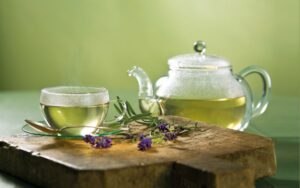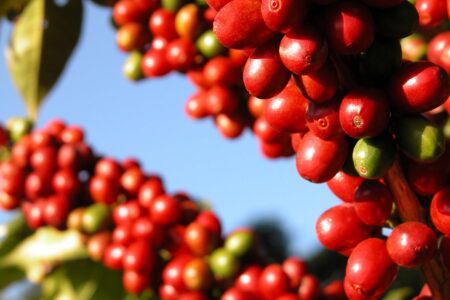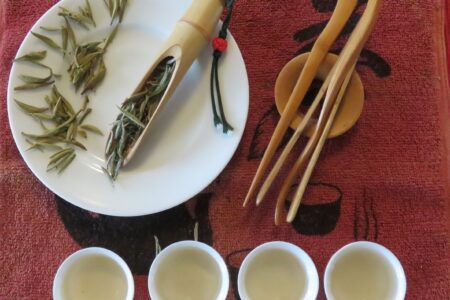Gendered teas: a marketing strategy or women’s reprieve?

Image: Herbs & Kettles
The popularity of and continued consumer interest in functional teas is nothing new, but a growing subsegment of this is women’s wellness teas. This article explores the niche but growing category and whether or not these teas are legitimately offering women relief or are they a marketing ploy? By Kathryn Brand
The post-Covid surge in the popularity of functional beverages is ongoing and has significantly bolstered the consumer spend and interest for such products, or rather ‘the wellness economy.’ As this movement has matured, it has, by extension, expanded and brought to the forefront wellness teas specifically catered towards women. This, combined with a growing feeling of disempowerment of women’s health needs, has resulted in a strong market demand in the women’s wellness tea category.
There is an ever growing group of companies that offer women’s wellness tea products, whether they are tea companies that have expanded their product portfolio to meet the demand, or companies which have founded themselves on the premise of supporting women through tea. HotTea Mama falls under the latter. Founded by Bethan Thomas and Kate Achilles, the brand offers consumers a selection of products to support different stages of women’s reproductive life, from menstruation, pregnancy, nursing, and menopause.
Thomas, co-founder and tea scientist at HotTea Mama, explained the premise behind the company’s founding, “It wasn’t until I got pregnant that I realised the majority of the herbal blends that I was creating, weren’t suitable for pregnancy due to many of the ingredients inside. This triggered the idea for HotTea Mama, as my best friend [and I] went through motherhood and suffered with morning sickness, struggles breastfeeding and sleeping… We wanted to make teas that were suitable for this life stage, to be both delicious and supportive. As we grew, our customers started to ask if any herbs or teas could support periods and perimenopause, and I used my tea biochemistry knowledge to create blends for this time of life too.”
Similarly, Poorvi Chordia, founder of Herbs & Kettles, which sells premium single-origin Indian teas, was inspired to create teas for women’s wellness due to personal and professional experience. “As a woman and a frontline physician, I experienced firsthand the importance of self-care and stress management, especially in the face of life’s challenges. Tea played a significant role in keeping me grounded and providing moments of solace during stressful times.”

Wollenhaupt offers a large variety of herbal teas, including a ‘Women’s Power’ blend. Image credit: Wollenhaupt
Meanwhile, Smith Tea recognised its high number of female-identifying customers and wanted to offer a product with health and wellness and “functional nourishment” as a priority, commented Sara Kaufman, product development manager and lead tea maker for Smith Tea’s Empower Mint blend, which was specifically designed with holistic women’s health in mind.
A demand for holistic wellness
Tea companies are noting and building on the idea of women as individual and important consumers with significant purchasing power. “Women’s health is a priority for Traditional Medicinals because we recognise the unique needs and experiences of women throughout their lives. We believe in providing natural and effective support for women’s health concerns, from menstrual health to pregnancy and lactation support,” shared Kristel Corson, chief marketing officer, Traditional Medicinals.
But why is it that women are turning to teas for their health needs in the age of modern medicine? It is part of the growing consensus that the Covid-19 global pandemic inspired, that self care and holistic wellness is something that should be prioritised and sought after in everyday products through functional food and drinks. “During the pandemic, we have learnt that many people have taken more time for themselves again […] People are living more consciously and paying more attention to their health and diet,” noted Michael Görres, head of product development at Wollenhaupt.
Smith Tea’s Kaufman added that “the pandemic highlighted a long-forgotten (or perhaps just overcomplicated) need for finding holistic wellness in our lives. From work-life balance to cleaner eating, the wellbeing economy supports wellness across the board and functional teas sit at the pinnacle of that.” At a time when people felt a need to have some control and agency over their health, a functional beverage market blossomed and remains a strong category even still.
But taking power and control over one’s own health, in the ways that one is able, is something particularly pertinent to women. Thomas explained that “women’s wellness and health has been hugely neglected in society and in medicine for a very long time, which has made women more open to looking at their health holistically.”

Smith Tea’s Empower Mint tea contains four herbs that cover systematic health for women of all ages and demographics. Image credit: Smith Tea
Some medical professionals cite concerns, however, that women are turning to alternative therapies “at the expense of engaging with proven medical approaches, and with conditions such as endometriosis affecting around one in ten women of reproductive age, this kind of marketing can be dangerous,” wrote Dr James Brown, senior lecturer in biology and biomedical sciences, Aston University, in a Guardian article titled “Women: beware teas with a gender agenda.”
However, this perspective overlooks the fact that many women do seek professional medical intervention, but use holistic healthcare, such as herbal teas, alongside it, or as a last resort when doctors are not able to help. “The truth is, that there is a huge medical gap in the UK, and all other countries. Women are often not recognised or heard by their doctors. Especially with conditions like endometriosis, PCOS (polycystic ovary syndrome) and adenomyosis — these are hard to diagnose and women on average have to wait 7.5 years for a diagnosis. In this time, they are forced to take charge of what they can in their diet and lifestyle to support,” added Thomas.
Studies and traditions
While it is true that women cannot necessarily expect a cure for their female-related ailments through wellness teas, there is a growing portfolio of scientific evidence and studies that show an amount of benefit can be seen from regular consumption. An example of this is an article titled “Herbal Infusions and Women’s Health: A Review of Findings with a Focus on Human Studies on Specific Infusions with Studies on Extracts to Evaluate Mechanisms,” by Gill Jenkins, Christopher John Etheridge and Pamela Mason, from the Journal of Nursing and Women’s Health sourced via Gavin Publishers. The paper demonstrated that German chamomile, rosehip and spearmint are all shown to give women health benefits in human trials. German chamomile was found to improve aspects of sleep in postnatal women, as well as being beneficial for pre-menstrual syndrome (PMS), anxiety, stress, and metabolic control.
Rose hip was associated with improved symptoms of menstrual pain, and spearmint improved hormone control. “These infusions contain a range of phytochemicals, including flavonoids, which help to explain their health outcomes. Most of the human studies indicated that 1-3 cups daily with brewing times of 5-15 minutes provided the health benefit in question,” the study noted.
Raspberry leaf, red clover, ginger and turmeric are also routinely favoured in women’s wellness tea offerings and are among those that have been used as herbal remedies stretching back generations. Companies endeavouring into women’s wellness teas have to choose how to balance verifiable scientific evidence with anecdotal and traditional uses. “We’re careful to only use ingredients that have historical use but are also backed up with research in more recent years. While the research studies are often small scale, we work with a technical agency to review new research regularly and ensure that there is as much evidence as possible to suggest that the majority of women will benefit,” said Thomas.
It is this deeply rooted historical practice that also may also be bolstering the attraction of wellness teas for women, observed Corson. “The appeal of these teas to women may be rooted in their historical connection to nature and traditional herbal practices that have long been passed down through generations of women.”
Chordia also noted that women tend to be more open to “an integrative approach towards health.” She added that “they are also more [receptive to] trying Eastern medicine which has a multitude of health benefits and often functional teas and tinctures play an important role in these alternative approaches. Women more often form communities that empower each other, and that often helps them take charge or ownership of their health and wellbeing than men.”

HotTea Mama offers a range of wellness teas for different stages of women’s reproductive life. Image credits: HotTea Mama
While many companies stress that their wellness teas can benefit both men and women, they are overwhelmingly finding that their consumer base is dominated by women and as such, are marketing their teas with this in mind. However, some view gendering teas as a marketing strategy in itself. Görres explained, “In the herbal tea sector, it can make sense to develop gender-specific teas for the respective needs and with a target-group orientated approach.”
On the whole, people tend to drink herbal teas for their health benefits as well as just their flavour, and since men- and women-identifying individuals often have different wellness needs, especially in relation to reproductive health, it makes sense for teas to be targeted in this way. Corson noted that this must be done with some care; “gendering teas can be a marketing strategy to target specific demographics and highlight the relevance of certain products to their unique needs. However, it’s essential to ensure that gendered marketing does not reinforce stereotypes or exclude potential consumers. Ultimately, the effectiveness of marketing strategies depends on the authenticity of the brand’s message and its ability to resonate with consumers’ values and experiences.”
Market movements
With herbal tea market sales expected to grow at a CAGR of 7.3 percent to USD $7,693.5 million between 2023 to 2033, according to market research company, Future Market Insights, there is no doubt a driver of this is consumers’ search for products to improve their health and play a functional role in their beverage consumption. The trend for customisation is expected to influence this market with consumers wanting tea formulations for their specific health concerns, including women’s wellness. These are also anticipated to grow in the organic and ‘natural’ space as “people are making a conscious decision to drink better quality teas that are organic, directly sourced and fresh, farm to cup,” said Chordia.
While some may consider women’s wellness teas a trend or marketing gimmick, and for some companies that may be true, but there are equally companies that are investing in the research and utilising centuries old traditions of herbal remedies to give women comfort, relief, relaxation, or even just a moment of pause to enjoy a delicious cup of tea. And with the functional market and ‘wellbeing economy’ ever-growing, this category is not expected to go away any time in the foreseeable future.
- Kathryn Brand is an associate editor on T&CTJ, while still writing for several of Bell’s other magazines. She joined Bell Publishing after graduating from the University of East Anglia with a degree in English Literature and Creative Writing. She may be reached at: [email protected].



